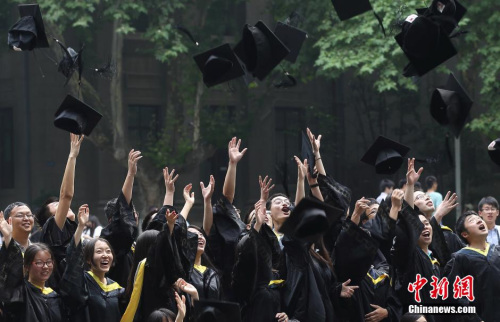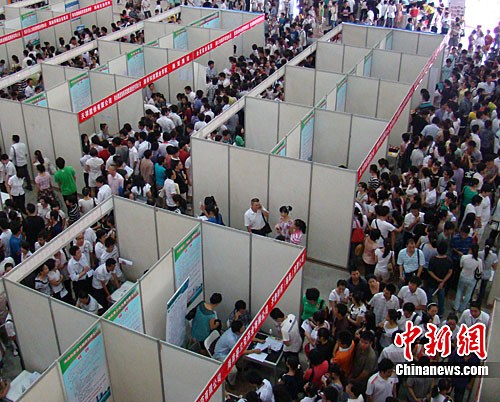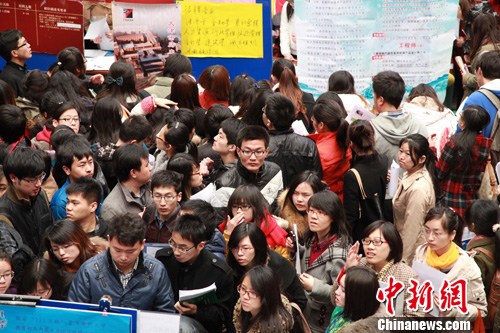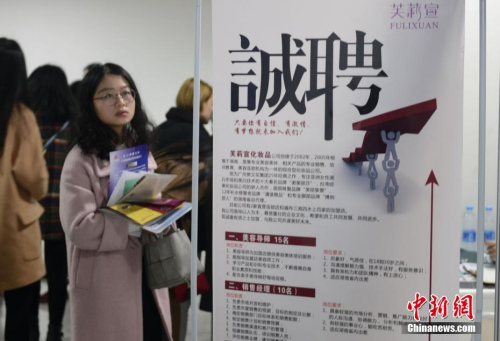Focus on the "slow employment" of graduates: training ability or enriching experience first?
BEIJING, Beijing, December 14 (Lv Chunrong) Although the graduation season in 2016 is far away, there are still some graduates who are not in a hurry to find jobs, but choose to travel, stay at home with their parents and continue to wait for opportunities to start their own businesses. Nowadays, the phenomenon of "slow employment" of college graduates has become increasingly prominent, which has also attracted more social attention.
In this regard, Guo Sheng, CEO of Zhaopin, said in an interview with Zhongxin.com (WeChat WeChat official account: cns2012) that "slow employment" is not necessarily a bad thing. For some students, they can use this period of "slow employment" to increase their social experience and broaden their horizons. However, some experts oppose students’ "slow employment" and think that they should get employment as soon as possible and receive exercise.

Data map. China News Agency issued a photo of Libo
Phenomenon — —
It’s not that you can’t find a job, but the phenomenon of "slow employment" of graduates is outstanding.
"What are you suitable for after graduation?" Nowadays, such confusion exists in the hearts of many college students, and it also puzzles Jiang Li, who just left the campus this year.
Like many post-90s generation, Jiang Li has his own set of ideas on employment choice. Unable to find a satisfactory job and unwilling to find a job casually, he joined the "slow employment" group and chose to stay at home with his parents while slowly considering and planning his career.
At this time, as a senior member of the "slow employment" family, Liu Ying, a post-90 s girl, is internship in a public institution. Due to a well-off family, Liu Ying, who graduated for more than a year, had not been in a hurry to find a job before. Her main "job" was to review and take the civil service exam according to her parents’ wishes. However, due to repeated setbacks in recent civil service exams, she decided to find an internship first and then continue to take the civil service exam.
Although the situation is different, it is obvious that in recent years, like Jiang Li and Liu Ying, more and more graduates choose "slow employment".
According to media reports, by comparing the distribution ratio of unemployed people among college graduates from 2010 to 2014, MyCOS Research Institute, a third-party survey agency, found that in recent five years, the proportion of college students who are still unemployed after graduation for six months has gradually increased, and the phenomenon of "slow employment" has become more and more prominent. In addition, a big data report of graduation season released by an online platform in July this year showed that 52% of the post-95 generation chose to find a stable job, but the remaining 48% chose to avoid employment.

The picture shows a sea of job seekers at the job fair. China News Agency issued Fu Meibin photo
Reason — —
To escape from reality? Work is not ideal, rational search for development directionDominate the mainstream
"Slow employment" doesn’t mean no employment. So, what exactly do graduates choose "slow employment"? Some people believe that there are not only the influence of employment situation and employment structure, but also the change of employment concept of the younger generation.
Guo Sheng analyzed, "First, the real problem is that some students from universities and schools with poor qualifications failed to find good jobs, which led to his delay. Second, some people intend to study abroad, practice or try new things and develop hobbies. "
The 2015 Employment Report of College Students in China released last year conducted a survey on the graduates of 2014. The survey shows that the main reason for graduates to choose "slow employment" is "unable to find a satisfactory job", with 57.7% of respondents choosing; Secondly, the respondents hope to "rationally find the direction of development and are unwilling to be bound by specific work before finding the direction"; Once again, it is "preparing to start your own business". Reasons such as "going to the postgraduate entrance examination" and "wanting to be a freelancer" are also in the forefront.
Obviously, the phenomenon of "slow employment" is also closely related to the change of students’ employment concept at present. The salary problem is no longer the decisive factor for many college students to get employment. They are more concerned about their desire to be respected and whether their work is ideal or not.
A few days ago, a survey report released by Zhaopin showed that among the components of ideal employers for college students, the top six are: respect for employees, good income prospect, fair and just employment principle, perfect welfare treatment, attractive corporate culture and salary return matched with employees’ contributions. It is noteworthy that the element of "respecting employees" goes beyond "good income prospects".

Data map. China News Agency issued Zhang Runzhe photo
Viewpoint — —
The dispute between "fast" and "slow" employment: exercise ability or enrich experience first?
Nowadays, the phenomenon of "slow employment" has become increasingly prominent. Some experts have analyzed that under the background of difficult employment for college students, the phenomenon of "slow employment" in recent years reflects that many people’s concept of job selection is quietly changing, no longer adhering to the traditional mode of "graduation is work", but paying more attention to future planning and employment quality. However, the problem of "gnawing at the old" at home does exist.
So, is "slow employment" good or not? Previously, in response to this phenomenon, social disputes continued. Some opponents criticize that advocating "slow employment" is an excuse for young people who don’t work hard. According to the data released by the Ministry of Education earlier this month, the number of college graduates nationwide in 2017 is expected to reach 7.95 million, 300,000 more than that in 2016. In the face of fierce employment competition, if you hand in your resume slowly, you may miss the opportunity. If you advocate "slow employment" again, won’t you take people into the pit?
However, some supporters believe that "slow employment" has become a part of employment reality, and graduates should be given more choices from education authorities to universities, parents and employers.
"I object to ‘ Slow employment ’ This statement. " Zeng Xiangquan, director of China Employment Research Institute of Renmin University of China, said in an interview with Zhongxin. com that college students should "get jobs quickly" at present, and some post-90s students are lazy and have poor discipline. Only when they enter the workplace early will they know what they have learned and what they need as soon as possible.
Zeng Xiangquan pointed out that there is a problem that theory is divorced from practice in China’s education. Therefore, no matter whether graduates choose large enterprises or small enterprises, they can better understand the relevant requirements and knowledge and exercise their abilities by entering the workplace.
Guo Sheng thinks that, in fact, "slow employment" is not necessarily a bad thing. In China’s education system, college students have learned a lot, but in fact they lack internship links and travel experiences that can really open their eyes, including studying in foreign countries and other places. Therefore, some students who choose "slow employment" want to spend half a year or a year to increase their social experience and knowledge experience, which is actually a good thing.
Guo Sheng also pointed out, "Of course, there are also bad phenomena, such as graduates ‘ Needing the old ’ Or some people are unwilling to make more efforts because they have no financial burden. However, most of the students we see still want to get a job very much, or they want to work hard in their own direction, but they may want to know and see the world as much as possible before they get a job.

Data map. Photo by Yang Huafeng
Suggestions — —
Experts say that college students need professional guidance in employment.
However, whether it is "slow employment" or "fast employment", employment pressure is a problem that college students have to face.
In February this year, Minister Yin Weimin of Ministry of Human Resources and Social Security introduced that the number of college graduates this year is 7.65 million, an increase of 160,000 over last year, and the number of secondary vocational school graduates and students who will not continue their studies after graduating from junior and senior high schools is about the same. "The employment groups of young people add up to about 15 million, and this pressure is also very great."
In response to this problem, the reporter noted that in recent years, government departments have issued many policies and opened up many channels to guide college students to find jobs and start businesses. For example, recently, the Ministry of Education issued the Notice on Doing a Good Job in the Employment and Entrepreneurship of Graduates of National Colleges and Universities in 2017, in which some new employment measures were introduced to encourage universities to give priority to the transfer of scientific and technological achievements to small and micro enterprises founded by college students.
Some people think that in the "internet plus" era, the government’s policies on entrepreneurship and employment encouragement are well suited to the characteristics of the times, so the society should follow suit.
To this end, some experts suggest that an urgent task to solve the employment problem of college students is to establish a professional and professional level of employment guidance team, including school employment guidance personnel and labor market employment guidance personnel. (End)